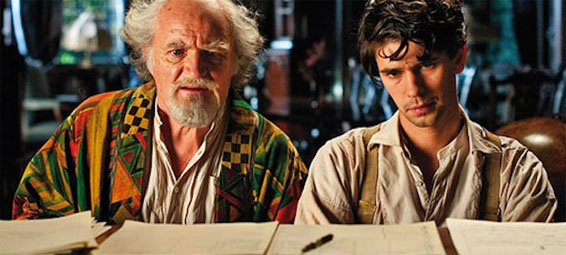Sometimes strange things happen to us at the movies. Cloud Atlas, a collaborative effort by the directors of The Matrix teamed-up with the director of Run Lola Run, is an occasionally visually bizarre, but by no means strange film. But if you’ll indulge me, I’ll recount something strange that happened to me while watching it. About halfway through the epically-long (and straining epic) movie, a character played by Jim Broadbent off-handedly says the line, “Begin afresh, afresh, afresh.”
It’s a nice little, easy to overlook piece of dialogue, and considering the entirety of the film, with its plot is set across five time periods, loosely telling the story of a recurring moral choice reenacted by a number of individuals played by the same recurring actors – a kind of reincarnation metaphor straight out of central casting – it is an appropriate bit of dialogue. After all, in the moment Broadbent’s character Timothy Cavendish is trying to begin his life “afresh, afresh, afresh,” sneaking up on the home of a lover from his youth he let get away. And in the wider context of the film, all of these characters, in one way or another, are searching for new beginnings. They all run up against the same obstacle: oppression loosely write, and manifested alternatively as slavery; homophobic bigotry; a corporate conspiracy; a nasty, vindictive family member teamed up with a health institution; a dystopian, Orwellian government; and a Darwinian, primordial social order set in a post- apocalyptic future.
But here’s the strange bit about that line, “Begin afresh, afresh, afresh.“ Last week, for nearly completely random reasons, I spent three days committing a little three stanza poem by the British poet Philip Larkin to memory. That poem is called “The Trees,” and its last line is, “Begin afresh, afresh, afresh.” Now discovering a quote from a favorite poem in a film is one thing, itself not an altogether odd or unsettling occurrence. But when that line is quoted in a film, which you are watching a week after you have arbitrarily decided to memorize the poem, and that film is in itself a parable about the impossibility of coincidence – that reality is a nebulous chain of being in which fate and love, hope and revolutionary spirit are the sutures that hold together the fabric of eternity — you’re wonton to feel a little, well, caught in the matrix.
That said, Cloud Atlas is not nearly a good enough film to make any sudden onslaughts of existential disorientation worrying for too long. Its moral/ethical weltanschauung is just too wonky and hazy for all that. As mentioned, we get six stories, and like most anthologies, some are stronger and more complete than others. In the late 19th century, we’re aboard a ship with a sick man who is harboring a black stowaway. In the 1920s, The Hour’s wonderful Ben Whishaw plays Robert Frobisher, who flees his male lover to take refuge with a dying composer, usurping the old man’s talent in the process. In the 1970s, that lover of Robert’s leads journalist Luisa Rey (Halle Berry) into a conspiracy by a big oil company intended to disrupt the development of nuclear fuel. There’s also a storyline about “Neo-Seoul,” a mega-opolis at the end of the 22nd century which projects Fritz Lang’s early 20th century dystopia into the future with the same kind of exploitation of human resources. And finally there’s the post-apocalyptic world inhabited by Tom Hanks’ double-talking Cast Away-meets-Forest Gump tribal family man who is haunted by demons and fighting off blood-thirsty thugs before he encounters a woman from another world, again played by Halle Berry.
Berry and Hanks are not the only actors who play multiple rolls in the film. In fact, that multiple casting trick is what keeps Lana and Andy Wachowski’s story, an adaptation of an incredibly unwieldy and narratively baroque novel by David Mitchell, lucent and cohesive – itself a remarkable directorial feat. But the casting also downplays the particulars of each story, turning the entirety of the film into something of a browbeating sermon, redundantly pounding away at the same themes over millennia. That’s the point, of course, the Wachowski’s have universal truths to tell us about, and they are going to let us know, by golly. But then their directorial partner, Tom Tykwer, undoes the project by delivering the film’s best segment, a set-in-the-present-day octogenarian farce staring Broadbent as rabble rousing publisher “tricked” into incarceration in a nursing home. This story possess the kind of hilarious and wrought humanity lacking in the other segments, and it feels as if Tykwer is inadvertently out to prove with this sequence that comedy is infinitely more profound than philosophy, or at least the kind of ponderous equivocating the Wachowski’s have a taste for.
But still, the line: “Begin afresh, afresh, afresh.” It is no accident that Philip Larkin’s voice is conjured in Cloud Atlas, the anarchic poet who toppled idols in the song of common speech. In fact, despite the evocation of “The Trees,” a poem that in actuality presents the idea of rebirth as a trick played by the seasons on those of us who hope to find eternity in the sexual rhythm of blooming branches, it’s another Larkin poem that is best applied to Cloud Atlas. In “Church Going,” the poet writes:
A serious house on serious earth it is,
In whose blent air all our compulsions meet,
Are recognized, and robed as destines.
That there is Cloud Atlas — and more, and in scant as much time. See, I’ve just saved you some of your time — your real life — you know, the one you are actually living, right here, right now.






